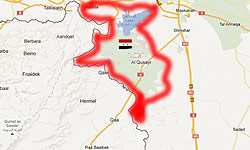Source: Geneva II Conference Delayed Until Fate of Al-Qusseir Battle Comes to Light

 The current battle in Al-Qusseir will play a determining role in the outcomes and bargaining power of participating sides in the upcoming Geneva II conference on Syria, and the international gathering will be held only when the fate of this battle comes to light, a Syrian military source said Sunday.
The current battle in Al-Qusseir will play a determining role in the outcomes and bargaining power of participating sides in the upcoming Geneva II conference on Syria, and the international gathering will be held only when the fate of this battle comes to light, a Syrian military source said Sunday.
The source, who asked to remain anonymous, told FNA that Moscow has promised Damascus to postpone the Geneva II conference until the Syrian army’s complete victory in the fight against rebel groups in the strategic city of al-Qusseir in Homs province near the border with Lebanon.
“Russia has promised Damascus that it will postpone the Geneva II conference until the Syrian army comes to the end of al-Qusseir battle, and it was decided that the conference be held after the army announces al-Qusseir as a secure region,” the source told FNA.
The source stressed that the al-Qusseir battle will end soon, and that the Syrian army will wrap up the situation in that region no later than June 10.
He added that top Syrian and Russian officials are in continued contacts over the developments in Qusseir as well as the Geneva II conference.
The armed rebels fighting the government of the Syrian President Bashar al-Assad have been entrenching in al-Qusseir since last year.
Last month, the Syrian army waged a large scale operation to regain al-Qusseir, trying to take control of all the towns surrounding the area so as to cut the supply lines of the rebels entrenching inside the city.
Last week, the army reached the center of al-Qusseir city after unleashing the wide-scale operation to recapture the strategic border city.
The rebels in al-Qusseir have been buoyed by Salafi groups in Lebanon’s Northern city of Tripoli. The Syrian government recently warned that it would not waver in face of the armed groups that are moving between Syria and Lebanon.
Last week, Syria’s air force dropped leaflets urging people in al-Qusseir to leave their homes in anticipation of furious battles for control over the city. Sources said that more than 400 families have fled the city since last week.
Earlier reports said that the US and Qatar are set to boost their support for the militants operating inside Syria, in an act of foreign interference in the internal affairs of the crisis-hit Middle Eastern country.
US Secretary of State John Kerry said that Washington would double its assistance to the militants in Syria.
The new plan by the US and Qatar is the latest instance of foreign meddling in the internal affairs of Syria.
Other regional countries have also been providing the militants in Syria with various forms of support. Qatar has been leading such efforts.
On April 22, during a meeting with Arab League Secretary General Nabil al-Araby, United Nations Secretary General Ban Ki-moon called on Qatar and some other Arab countries to stop supplying weapons to the militants in Syria.
Syria has been experiencing unrest since March 2011 with organized attacks by well-armed gangs and terrorists against Syrian forces and civilians being reported across the country.
The US and its western and regional allies have long sought to topple Syrian President Bashar al-Assad and his ruling system. Media reports said that the Syrian rebels and terrorist groups have received significantly more and better weapons in recent weeks, a crime paid for by the Persian Gulf Arab states and coordinated by the United States.
The US daily, Washington Post, reported in May that the Syrian rebels and terrorist groups battling Assad’s government have received significantly more and better weapons in recent weeks, a crime paid for by the Persian Gulf Arab states and coordinated by the United States.
The newspaper, quoting opposition activists and US and foreign officials, reported that Obama administration officials emphasized the administration has expanded contacts with opposition military forces to provide the Persian Gulf nations with assessments of rebel credibility and command-and-control infrastructure.
Opposition activists who several months ago said the rebels were running out of ammunition said last May that the flow of weapons – most bought on the black market in neighboring countries or from elements of the Syrian military in the past – has significantly increased after a decision by Saudi Arabia, Qatar and other Persian Gulf states to provide millions of dollars in funding each month.







